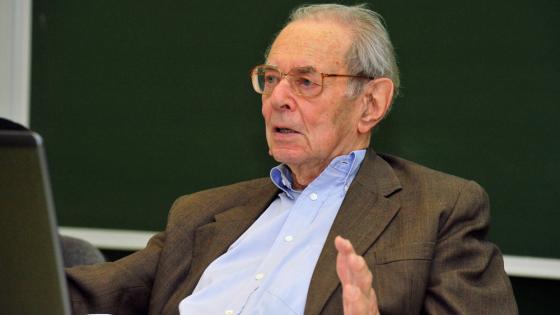The famous Hungarian economist János Kornai has left us. He was one of the most important intellectuals of the twentieth century. He suffered personally from both Nazism and communism, the two totalitarian regimes of the twentieth century. As a young Jew growing up in Budapest, he lost his father and a brother to the Nazis. Like many young Jews in Central Europe who survived the holocaust, he was for a couple of years an enthusiastic supporter of communism, the arch-enemy of Nazism. He became disillusioned after a few years, especially when learning about the Stalinist purges in Hungary in the early 1950s. He had been a journalist at that time.
His doctoral dissertation in economics, Overcentralization in Economic Administration, was full of facts about the flaws of central planning and represented a great breath of fresh air in the intellectual atmosphere of the times. He defended that dissertation just before the Soviet repression of the Hungarian revolution of 1956. His defence was attended by a big crowd and was one of the important intellectual events of that year. Given the visibility of his doctoral thesis, when the repression came, he lost his job at the Institute of Economics (later a hotbed of thinking about reforms), was interrogated, and eventually got marginal jobs, first at the Light Industry Planning Bureau and later at the Textile Industry Research Institute.
Instead of becoming discouraged or cynical, he used the free time he had in these obscure jobs to study economics seriously and to get better acquainted with economic research that was being practiced in the West, on the other side of the Iron Curtain. His work on two-level planning with Tamás Lipták was published in Econometrica and became an important paper in the literature on the economics of planning. This earned him the recognition of top economists of the time: Kenneth Arrow, Leonid Hurwicz, Tjalling Koopmans, Edmond Malinvaud and others. The Hungarian authorities, who were more liberal than other communist regimes, even allowed him to travel to conferences in the West, albeit under heavy supervision of the secret police.
Instead of ‘just’ becoming Central and Eastern Europe’s top economist (together with the more senior Leonid Kantorovich, the inventor of linear programming, who received the Nobel prize in 1975), he wrote in 1971 a book with the provocative title Anti-Equilibrium that represented a thorough criticism of the relevance of general equilibrium theory, the crown jewel of economic theory. That book also proposed to add considerations related to the informational sphere of the economy, developing themes such as informational asymmetry, bargaining, conventions, routines, aspirations – topics that would be developed later by other economists.
The most developed thesis of that book was that capitalist economies were in a state of constant excess supply (overproduction) whereas centrally planned economies were in a state of constant excess demand (shortage), and he drew out with minute detail all the implications of this analysis. I remember raising arguments from his book in my general equilibrium class in university, surely annoying the professor. Olivier Blanchard once told me he had a similar experience. Kornai’s book was extremely popular among young rebellious economists who wanted to change the world.
In 1980, his magnum opus, Economics of Shortage, came out. Whereas his earlier work on the economics of planning was mostly theoretical (all that literature was very remote from how planning was done in reality), this was the first book to propose a systematic and powerful analysis of how the socialist economy really worked in practice. Starting with the concept of the soft budget constraint (state-owned enterprises in socialist economies that were making losses would never shut down), he explained how this led to increasing demand by enterprises, making them barely responsive to price variations. These increased demands led to generalised shortages that deeply influenced the behaviour of enterprise managers, consumers and planners.
No other book had analysed the effects of shortages in such a comprehensive manner over hundreds of pages. His analysis was repeated in an even more comprehensive way in The Socialist System: The political economy of communism in 1992, where he could write without resorting to self-censorship and explain clearly the role of the Communist Party in the institutional setup of the socialist economy.
When the Berlin Wall fell and communist regimes collapsed one after another in the late 1989, Kornai wrote a short book, The Road to a Free Economy, outlining a clear programme for an economic transition to the market economy. Like many other economists including myself, he was opposed to mass privatisation and favoured an organic development of the private sector. Most of his views on transition turned out to be correct.
He continued writing influential papers about transition and reforms in his nineties, even as his health gradually deteriorated. He made a splash two years ago by expressing his regrets about having advised the Chinese communist regime to have created a ‘Frankenstein’ – that is, a very successful capitalist economy under a communist regime representing the most important threat to freedom in the world today, due to its growing strength and hegemonic ambitions.
Throughout the transition process, he always insisted on his ‘lexicographic preferences’: freedom, human rights and democracy come above economic growth and material welfare. After having lived through Nazism and communism, he was sad to see at the end of his life that democracy was being dismantled by the Orbán regime in Hungary.
Unlike many of my good friends, especially co-authors such as Yingyi Qian and Chenggang Xu, I was never his student, but his books had, and still have, a profound influence on my thinking as an economist. The first time I met him in person, I was a graduate student and he was president of the European Economic Association in 1987. Needless to say, I was very intimidated by him and it took me a lot of courage to approach him to talk about research.
I was lucky to spend a month in 1992 at Collegium Budapest, where we got to talk more about transition. When he retired from Harvard in 2002, he came with his wonderful wife Zsuzsa to see me at Berkeley in a ‘farewell tour’ he was doing of American universities. We stayed in close contact, and wrote an article together with Eric Maskin for the Journal of Economic Literature, surveying the literature on the soft budget constraint.
In 1999, the Nobel Foundation had asked Olivier Blanchard and me to organise a Nobel symposium on the Economics of Transition. Kornai was of course the big hero of the day. Often, these symposia are seen as a preamble to a Nobel prize. It was not to be, even though Kornai’s name floated around for decades as a possible laureate for the Nobel prize in economics for his work on the socialist economy.
I was glad to be able to see him many times in his apartment in Buda after that, overlooking the Danube and to eat together in Óbuda at Sipos, one of his favourite restaurants. He profoundly loved his country and had developed deep roots in Hungary. Even though his English was spotless, he always preferred writing his books and articles in Hungarian first. He made me discover Imre Kertész and other Hungarian writers who he admired. He is not with us any more, but he will continue to inspire me as well as many other researchers. A true intellectual hero!
References
Blanchard, O (1999), “An Interview with János Kornai”, Macroeconomic Dynamics 3: 427-50.
Kornai, J (1959), Overcentralization in Economic Administration: A critical analysis based on experience in Hungarian light industry, Oxford University Press.
Kornai, J (1971), Anti-Equilibrium: On economic systems theory and the tasks of research, North-Holland.
Kornai, J (1986), “The Soft Budget Constraint”, Kyklos 39(1): 3-30.
Kornai, J (1980), Economics of Shortage, North-Holland.
Kornai, J (1990), The Road to a Free Economy: Shifting from a socialist system – the example of Hungary, Norton.
Kornai, J (1992), The Socialist System: The political economy of communism, Clarendon Press.
Kornai, J (2008), By Force of Thought: Irregular memoirs of an intellectual journey, MIT Press.
Kornai, J, and T Lipták (1965), “Two-Level Planning”, Econometrica 33(1): 141-69.
Kornai, J, E Maskin and G Roland (2003), “Understanding the soft budget constraint”, Journal of Economic Literature 41: 1095–1136
Roland, G (2008), “A Review of János Kornai's By Force of Thought: Irregular memoirs of an intellectual journey”, Journal of Economic Literature 46(1): 145-50.



